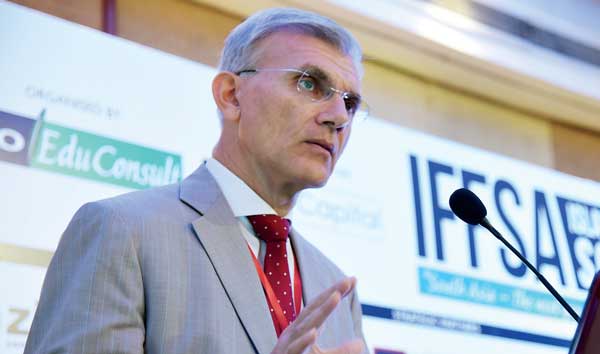28 Jul 2016 - {{hitsCtrl.values.hits}}

Since 2009 Sri Lanka has had a peace dividend. Growth rates have increased 6-7 percent until 2-3 years ago, and 5 percent or thereabout now according to official figures. As you would expect, peace has brought an increase in construction, tourism, in retail and so on
But it’s not rested on solid foundation, but indeed very unsolid, rather brittle foundations. If I were to sum up the Rajapaksa years, I would make 4 points:
There was much more political authoritarianism. Sri Lanka was on the way to a thuggish one party system.
There was increasingly virile Sinhala Buddhist nationalist agenda, at expense of other minorities. Against muslims not just Tamils. Thirdly, very unbalanced foreign policies. China was very much first friends, with India and Western Countries held at very very distant arm’s length
Finally deliberalization of the economy. Sri Lanka became a much more statist economy. Government intervened much more not just with protectionism, but also in the local economy.
Growth relied on a debt-fuelled public spending spree. Growth came from the public sector—largely unproductive—at the expense of the private sector and Sri Lanka’s external economy. Sri Lanka’s exports declined sharply in those years.
What has changed?
So the big question is what has changed since the regime changed last year?
The good news is that political liberalism has returned somewhat to Sri Lanka. The air is freer, at least among the Colombo’s chattering classes. I’m not sure it matters that much to ordinary Sri Lankans outside Colombo and the Western Province The media criticizes freely, but the media is under pressure as we see, still.
Ethnic tensions are better, in the sense that tensions are somewhat subdued, but underlying problems have not been resolved, and they can’t be resolved with quick fixes. But keep in mind that this government was elected with the help of the minorities.
At least the right symbolic gestures have been made towards the minorities, without so far resolving the underlying issues on transitional justice in the wake of the war, on land rights and demilitarization. These are of course all long term issues, and we’ll see if the new constitution in the works does something to resolve them
Foreign policy I think is much more balanced, positively so. China is still a friend. We can’t afford to alienate china.
But friendships have been restored with India, the US and European countries. That is I think a good thing.
The bad news
The bad news now is on the economy. Also given expectations, not least by the aspirational classes who voted the President and then this government in, there is rising disappointment and frustration that actually, not much has changed. In some respects we’ve seen some things get worse. Macroeconomic management has always been something close to a disaster in Sri Lanka. It was under the Rajapaksa regime, and that has continued to be the case, with 2 very bad budgets last year. With the tax system that’s almost collapsed, with public spending increases, and salary increases and more expenditure entitlements along the way, which make Sri Lanka more reliant on debt including foreign commercial borrowings, which is increasingly vulnerable when interest rates are on the rise and money is flowing out of the more vulnerable emerging markets such as Sri Lanka.
Now there’s an agreement with the IMF, the Extended Fund Facility on the condition that certain tax reforms will be forthcoming. We will see.
But so far the government hasn’t come up with a credible plan for reforming the economy whether it be on taxation and expenditure as well as on other important issues like freeing up the business climate domestically and liberalizing Sri Lanka’s trade and foreign investments. All of those things have to be done. It hasn’t made that much progress, if any, over the past year and a half for all sorts of political reasons. There is cohabitation between the president and the prime minister, there’s an unwieldy national unity government. There have been several bad appointments, decision making has been rather messy and not as coordinated as it should be, and for these and other reasons, there has been blockage on economic policies.
And if these don’t change Sri Lanka faces either a future of continued drift way below its potential, which is the normal if you like since independence.
Or it could get worse and unravel. Because if the economy doesn’t perform, and if especially sri lankans outside Colombo continue to be frustrated, if things get worse, if there’s no investment, if jobs aren’t created, then other things could unravel too, including relationships with the minorities and the more liberal atmosphere sri lanka has enjoyed in the last year and a half. And that is something the country should avoid at all costs.
The window of opportunity for Sri Lanka is the best in 40 years since the late 1970s. That opportunity has not been taken advantage of in the last 18 months. I hope it won’t be squandered. There is still a lot to play for.
29 Nov 2024 20 minute ago
29 Nov 2024 1 hours ago
29 Nov 2024 2 hours ago
29 Nov 2024 3 hours ago
29 Nov 2024 3 hours ago